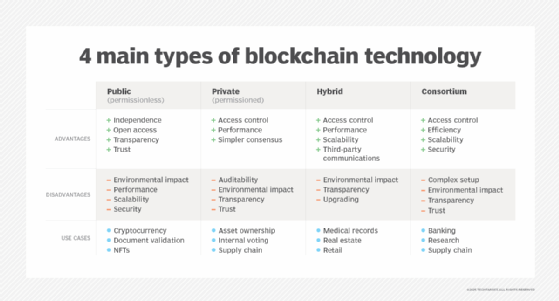Blockchain is a decentralized digital ledger that records transactions on multiple computers. In recent years, it has gained significant popularity due to its potential to revolutionize various industries.
In this beginner’s guide, we will explore the fundamentals of blockchain technology, its applications, and its benefits, helping you understand this innovative concept. So, let’s dive into the world of blockchain and discover its transformative potential.
Credit: finbold.com
What Is Blockchain

Blockchain is a revolutionary technology that has gained significant attention in recent years. Simply put, it is a distributed ledger system that allows for the secure and transparent recording of data across multiple computers. The concept behind blockchain is to create an immutable and decentralized database that can be accessed and verified by anyone.
Blockchain operates through a network of computers known as nodes, which work together to validate and record transactions. Each transaction is stored in a block and linked to the previous block, creating a chain of blocks – hence the name “blockchain”. This chain of blocks is maintained by a consensus algorithm, ensuring that all nodes agree on the validity of the recorded transactions.
One of the key features of blockchain is its transparency. Every transaction on the blockchain can be viewed by anyone, which enhances the trust and security of the system. Additionally, blockchain is resistant to tampering and fraud due to its decentralized nature.
In conclusion, blockchain is a groundbreaking technology that has the potential to revolutionize various industries by providing secure, transparent, and tamper-proof record-keeping. Whether you are a beginner or an experienced professional, understanding the basics of blockchain is crucial in this rapidly evolving digital landscape.
How Blockchain Works
Blockchain, the underlying technology behind cryptocurrencies, works on a principle of decentralization. This means that instead of relying on a central authority or intermediary, blockchain relies on a network of computers called nodes. These nodes validate and record transactions in a transparent and secure manner. Decentralization ensures that there is no single point of failure and that the data stored on the blockchain cannot be easily manipulated or tampered with.
In addition, blockchain consensus mechanisms play a crucial role in maintaining the integrity of the network. Consensus mechanisms enable nodes to agree on the validity of transactions and reach a consensus on the current state of the blockchain. Popular consensus mechanisms include Proof of Work (PoW), Proof of Stake (PoS), and Delegated Proof of Stake (DPoS). Each mechanism varies in terms of the computational resources required and the level of security it offers.
Overall, the decentralized nature of blockchain technology, coupled with robust consensus mechanisms, provides a secure and reliable platform for recording and verifying transactions. With its potential to revolutionize various industries, it’s important for beginners to understand how blockchain works and its underlying principles.
Types Of Blockchain
Public Blockchain: A type of blockchain that is open to anyone and allows for full transparency and decentralization. It operates on a trustless network where anyone can participate, validate transactions, and maintain the ledger.
Private Blockchain: This type of blockchain is restricted to certain individuals or organizations, providing them with control over the network. It offers a higher level of privacy and security, making it suitable for confidential transactions.
Consortium Blockchain: A hybrid model where a group of organizations controls the network, providing a balance between the openness of public blockchains and the control of private blockchains. It is well-suited for industries requiring collaborative efforts and shared control.

Blockchain Applications
Blockchain technology has various applications that go beyond cryptocurrencies. Cryptocurrencies are digital assets that utilize blockchain for secure transactions. Smart Contracts are self-executing contracts with terms directly written into code. In Supply Chain Management, blockchain ensures transparency and traceability of products.
Benefits Of Blockchain
Blockchain technology offers a decentralized and secure platform for digital transactions, removing the need for intermediaries. It provides transparency, immutability, and increased efficiency, making it an ideal choice for beginners looking to understand the potential of blockchain in various industries.
| Blockchain technology provides transparency by recording all transactions in a public ledger. |
| It offers security through cryptographic algorithms that protect data from being tampered with. |
| Blockchain enhances efficiency by reducing the need for intermediaries in transactions. |
Challenges And Limitations
Blockchain technology faces challenges and limitations that need to be addressed for wider adoption. Scalability is a major concern, as the current blockchain infrastructure struggles to handle a high volume of transactions efficiently.
Regulatory uncertainty adds to the challenges, as governments around the world grapple with how to regulate this emerging technology. This uncertainty can create hurdles for businesses and investors looking to adopt blockchain solutions.
Getting Started With Blockchain
Blockchain technology is gaining popularity and understanding its basic concepts is essential for beginners. One important aspect of getting started with blockchain is setting up a wallet. A wallet is a digital storage space that allows users to store and manage their cryptocurrencies securely. It is crucial to choose a trustworthy and reliable wallet provider to ensure the safety of your digital assets.
Once you have set up your wallet, understanding transactions is the next step in your journey. Transactions in blockchain refer to the movement of digital assets from one wallet to another. These transactions are recorded on the blockchain network and are highly secure due to the decentralized nature of the technology. The transparency and immutability of blockchain make it an ideal solution for various industries beyond just cryptocurrencies.
By familiarizing yourself with wallet setup and transactions, you can begin to explore the potential of blockchain technology and its various applications. Whether it’s for personal use or business purposes, blockchain offers a new way of exchanging value and conducting transactions securely and transparently.
| Key Points: |
|---|
| – Set up a reliable wallet to store and manage cryptocurrencies securely. |
| – Understand the concept of transactions on the blockchain. |
| – Blockchain technology provides transparency and immutability. |
| – Explore the potential applications of blockchain beyond cryptocurrencies. |
Future Trends In Blockchain
Blockchain technology is rapidly evolving and shaping the future in various ways. One of the significant trends is integration with IoT, where blockchain can enhance the security and transparency of IoT devices. By creating a decentralized and immutable ledger, blockchain ensures the integrity and authentication of data generated by these devices.
Another important trend is interoperability, which refers to the ability of different blockchain networks to communicate and share information seamlessly. Interoperability solutions like cross-chain communication protocols are being developed to connect various blockchain platforms, enabling efficient data transfer and collaboration.
These future trends in blockchain highlight its potential to revolutionize industries such as finance, healthcare, supply chain, and more. As businesses recognize the benefits of blockchain technology, further advancements and innovations are expected to emerge, driving the widespread adoption of blockchain in the coming years.
Frequently Asked Questions Of Blockchain Guide For Beginners
What Is Blockchain Technology?
Blockchain technology is a decentralized, secure system that stores data records chronologically. It enables secure transactions without the need for a middleman, offering transparency and tamper-proof data storage.
Why Is Blockchain Considered Secure?
Blockchain uses cryptographic algorithms and decentralization to secure data. Each block is linked to the previous one, forming a chain. This makes it nearly impossible to alter past transactions without detection, ensuring security.
How Can Beginners Start With Blockchain?
Beginners can start learning about blockchain by exploring online courses, reading beginner-friendly guides, and experimenting with simple blockchain projects. Understanding the basic concepts, such as blocks, nodes, and consensus algorithms, is crucial for beginners.
Conclusion
Mastering the basics of blockchain is crucial for beginners in today’s digital landscape. As you delve into this innovative technology, remember to stay curious and continue learning. With this guide, you’re equipped with foundational knowledge to embark on your blockchain journey.
Embrace the potential and numerous possibilities that blockchain has to offer.

